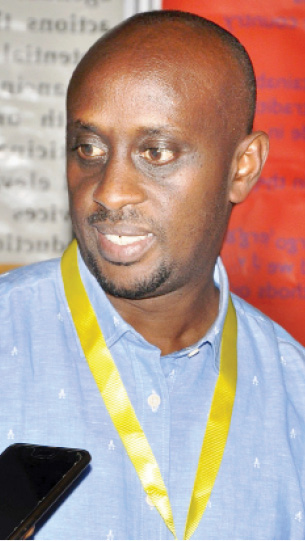How Rwanda honey gets Europe, Asia trusts
Shema Aimable is an official of the Rwanda National Agricultural Export Development Board (NAEB) in charge of Livestock Products for Export. He led the country’s delegation representing members of the Rwanda Apiculture Multi-Stakeholders Platform (RAMP) to the just concluded sixth ApiExpo Africa, Abuja to showcase and demonstrate how the honeybee industry in Rwanda fares. In […]

Mr Shema Aimable
Shema Aimable is an official of the Rwanda National Agricultural Export Development Board (NAEB) in charge of Livestock Products for Export. He led the country’s delegation representing members of the Rwanda Apiculture Multi-Stakeholders Platform (RAMP) to the just concluded sixth ApiExpo Africa, Abuja to showcase and demonstrate how the honeybee industry in Rwanda fares. In this exclusive interview with Daily Trust on Sunday during the event, he shared the county’s apiculture journey.
How would you describe Rwanda’s presence at the ApiExpo?
I am here with three honey processing business companies from Rwanda: Apiary, ABDC and Voice of Calling. As government, we also supported them to come here to show others what we are doing and also see what others are doing so that we can learn more.
How is Rwanda honey doing in the international market?
Beekeeping in Rwanda, for many years back, was done in traditional ways. But you know that in 1994 we had genocide, but after that, the government tried to make policies to boost most of the sectors, especially agriculture. In that regard, Rwanda has put in place a beekeeping policy, and more recently, beekeeping standards.
The three Rwandan companies here are certified to sell honey to Europe and Asia. What we did was to try and put all producers in the same platform, the Rwanda Multi-Stakeholder Apiculture Platform.
Before now, farmers were scattered and we thought it wise that in order to help them have a stronger voice, coordinated activities and monitory for standards, we decided to put them on the same platform. Through that platform they can get advocacy and information. And they can easily get support from government in terms of training, technical assistance, grants or financial assistance. That was how we were able to organise and supervise the value chain activities.
Rwanda hosted one edition of the event; how would you describe the impact of hosting the event to the country’s apiculture industry?
To host ApiExpo is just bidding. We bided in Harare, Zimbabwe and succeeded.
In 2016, we hosted it and saw its positive effect. After the event, more companies invested in the industry.
In fact, at the moment we have almost 10 companies certified to export honey to Europe and other parts of the world. I hope you know that Rwanda is among the few countries that are allowed to export honey to Europe? You can’t go there if your honey is not certified. Now, the certified companies and the number of clients abroad – Europe and Asia – are also increasing.
